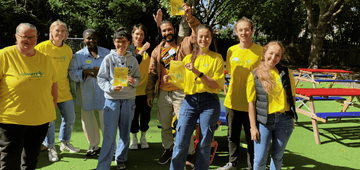Royal Society for Public Health (RSPH) calls for the Government to put further restrictions on gambling advertisements as part of its Gambling Act Review, as polling conducted by YouGov found that three quarters (77%) of adults and two thirds (66%) of 11 to 17 year olds would support a ban on gambling adverts being shown on TV and on radio before 9pm.
The research showed overwhelming support for tighter curbs on gambling advertising, with almost two thirds (63%) of the adult respondents and over half (53%) of the young people surveyed in favour of a total ban on ads for gambling products. Only 14% of adults and children opposed a total ban. The start of Euro 2020 means that football fans across the country will be exposed to gambling ads in the second half of matches with a kick-off at 8pm. A gambling advertising watershed would fall in line with recent announcements by the Government that adverts for foods high in fat, salt and sugar (HFSS) will be banned in broadcast media and online before 9pm.
The public were also in favour of:
- Stopping gambling adverts being shown on social media and online before 9pm (supported by 76% of adults and 64% of young people);
- Not allowing gambling companies to sponsor sporting events or teams (supported by 65% of adults and 54% of young people);
- Requiring the gambling industry to pay a levy to government for measures to reduce and prevent problem gambling (backed by 76% of the adults surveyed).
With the Department for Digital, Culture, Media and Sport now considering responses to the Gambling Act Review call for evidence, RSPH is calling for tighter rules for gambling advertising as part of a public health approach to reduce the harm caused by gambling.
Extensive evidence shows that advertising influences behaviour and drives gambling activity. Gambling products are addictive and can inflict widespread damage across society, with up to 20% of the population at risk of gambling harm[1]. Physical and mental health issues are linked to gambling difficulties, and gamblers are at a greater risk of suicide and early mortality.
Estimates suggest that for every one person with gambling difficulties, between six and ten others are harmed. Unsurprisingly, those who reported being negatively impacted ‘a great deal’ or ‘to some extent’ by someone else’s gambling were slightly more likely to back stricter measures, although there was broad support across the cohort.
Christina Marriott, Chief Executive of RSPH said: “Advertising is a powerful force in our society – it not only influences what we buy, but it also tells us what is normal, and what we should aspire to. Given the harm that gambling can inflict on individuals, families, workplaces and communities, we need to take a stronger stand against it being embedded into our social and cultural lives. We no longer allow air time to other products which harm our health, like tobacco products: gambling should be no different.”
Carolyn Harris MP, Chair of the Gambling Related Harm All Party Parliamentary Group said: “There is strong public and parliamentary support for a ban on gambling advertising. Gambling companies claim there is no evidence that gambling advertising causes harm. In fact, there is extensive evidence that shows how harmful gambling advertising can be and, in particular, the impact gambling adverts can have on children. Gambling advertising should be banned to protect children and those at risk from gambling harm.”
Tony Parente, Founder of GamLearn said: “The bombardment of gambling advertising and the way in which gambling is marketed is a risk to many. An industry whose profits thrive from those it harms should not be allowed to advertise so aggressively and in the way it does. The reality is that gambling has a side that the advertising doesn’t show: it isn’t fun for everyone, not everyone is smiling having a great day, it isn’t an entertainment activity and there is no such thing as a free bet. Gambling can impact your physical and mental health and can lead to suicide. That unfortunately is the reality and the more we allow this to continue, the more lives will be destroyed.”
Jo Evans, Gambling Harm Reduction, Greater Manchester Combined Authority commented: “In recent years we have seen a proliferation of advertisements and enticements to gamble, including in arenas which are populated by children and young people, such as sponsorship of sports teams and on social media. We are taking action to prevent and reduce gambling related harm in Greater Manchester and this data shows that people living in Greater Manchester and in the North West want to see stronger regulation of gambling. Given what we know about the extent and impact of gambling related harm, it is imperative that government seizes the opportunity to prevent more lives from being ruined.”
Phil Mackie, Chair of the Scottish Strategy Implementation Group said: “The history of advertising is peppered with examples of products that continued to be commercially promoted when the evidence for how the product can harm individuals, their families, and the communities in which they live is clear. These examples often follow a very similar pattern of organisations defending the right to advertise legally available goods or services, or questioning the evidence for harm, or defending the right of individuals to be able to make informed choices, and sometimes all of these in succession. All of which focus the debate on the advertising – and not on the harms that are being perpetuated. Ultimately, what changes things is the recognition that the public – to whom the advertising is targeted – say they are opposed to the advertising continuing. For Scotland, the YouGov data presented, show that we have reached this point with less than one in five of the people of Scotland opposed to a complete ban on gambling advertising. It is time for the UK Government to act.”
Greg Fell, Chair of the Gambling Related Harms Group for Yorkshire and the Humber said: “The data from the survey is overwhelming – most people think we should stop exposing our children, young people and vulnerable adults to this onslaught of adverts encouraging them to gamble. Gambling is becoming more accessible, available and socially and culturally accepted than at any time in history. We can and must do better to ensure that our regulations do as much as possible to protect our young people from the harms associated with these products. The powerful impact of mass advertising and sponsorship – particularly on young people’s awareness, attitudes and intentions has the potential to destroy lives.”
About the research
Adult data: polling was commissioned by Action on Smoking and Health and was conducted by YouGov. All figures, unless otherwise stated, are from YouGov Plc. Total sample size was 12,247 adults. Fieldwork was undertaken between 18th February and 18th March 2021. The survey was carried out online. The figures have been weighted and are representative of all GB adults (aged 18+). Respondents were asked if someone else’s gambling had impacted their life in a negative way in the last 12 months; 4% said ‘don’t know’, 88% said ‘not at all’, 4% said ‘not very much’, 2% said ‘to some extent’, and 1% said ‘a great deal’.
Child data: polling was commissioned by Action on Smoking and Health and was conducted by YouGov. All figures, unless otherwise stated, are from YouGov Plc. Total sample size was 2,513 children. Fieldwork was undertaken between 25th March and 16th April 2021. The survey was carried out online. The figures have been weighted and are representative of all GB children aged 11 to 18.
Regional breakdown of support
How strongly, if at all, would you support or oppose a complete ban on all gambling advertising:
|
All GB |
North East |
North West |
Y&H |
East Mids |
West Mids |
EofE |
Lond |
South East |
South West |
Wales |
Scot |
|
|
Unweighted base |
12247 |
487 |
1357 |
1037 |
913 |
1062 |
1157 |
1335 |
1756 |
1107 |
1015 |
1021 |
|
Support |
63% |
63% |
64% |
64% |
66% |
63% |
63% |
60% |
65% |
66% |
63% |
58% |
|
Neither support nor oppose |
18% |
19% |
17% |
19% |
17% |
19% |
16% |
18% |
17% |
18% |
19% |
20% |
|
Oppose |
14% |
14% |
14% |
13% |
12% |
12% |
16% |
16% |
14% |
12% |
12% |
16% |
|
Don't know |
5% |
5% |
5% |
4% |
5% |
6% |
5% |
6% |
5% |
4% |
5% |
6% |
[1] Scored 1 or higher on the Problem Gambling Severity Index (PGSI), and therefore experiencing low level problems or greater



